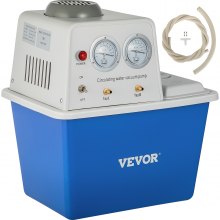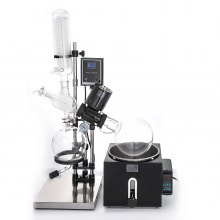Innovations and Future Trends in Rotary Evaporation Technology With VEVOR
Rotary evaporation remains a cornerstone technique important for countless scientific and industrial applications. Known for its effectiveness in chemical separation, this method has undergone remarkable development over the years, driven by technological advances and the demand for efficiency and accuracy.
Among the leading forces in this field, VEVOR stands out as a key figure, constantly pushing the boundaries of rotary evaporation technology with innovative solutions tailored to the evolving needs of researchers and industry worldwide.
Rotary evaporation has revolutionized the processes of separating solvents from solution, significantly increasing efficiency and accuracy compared to traditional distillation methods.
Who Uses A Rotary Evaporator?
A rotary evaporator is a versatile equipment widely used across various scientific, industrial, and academic sectors. Its flexibility and effectiveness in solvent removal make it indispensable for various applications.
Chemists and Chemical Engineers
Rotary evaporators are widely used in pharmacies and pharmaceutical industries for the removal, concentration, and purification of solvents. Chemists rely on rotary evaporation for various applications, such as extracting natural products, synthetic ingredients, and cleaning mixtures.
Environmental Analysis and Remediation
Environmental scientists and engineers use rotary equipment to analyze and remediate environmental pollutants. It is used to detect pollutants and to collect and analyze water, soil, and air samples for environmental quality assessment.
Oil and Petroleum Industry
Rotary evaporators are finding applications in the oil and petroleum industry for the separation and analysis of crude oil components, as well as the refining of lubricants, solvents, and other petroleum products.
Pharmaceutical Industry
Rotary evaporators play an important role in pharmaceutical research and development. It is used for post-processing solvent removal, plant extracts, and active ingredient (API) purification.
Advantages Of Rotary Evaporators
Rotary evaporators did not just become indispensable to the industries discussed above. Instead, their advantages over other methods have placed them in a great position. Here are some benefits of rotary evaporators.
Efficient Solvent Removal
One of the main advantages of rotary evaporators is their ability to remove solvent from liquid samples effectively. Adding a rotating flask to the vacuum system provides a large surface area for vaporization, facilitating rapid solvent removal and collection of desired products.
Precise Control over Evaporation Parameters
Rotary evaporators allow users to precisely control basic parameters such as temperature, rotation speed, and vacuum pressure. This level of control allows optimization of the evaporation process to achieve the desired results while minimizing sample degradation or loss.
Gentle Evaporation Conditions
Unlike some other steam processes that operate under milder conditions, usually at lower temperatures and lower pressures. This gentle evaporation helps preserve the natural integrity of chemicals, chemicals, biomolecules, and other heat-sensitive materials, reducing the risk of thermal damage.
Scalability
Rotary evaporators can be scaled up or down to suit sample sizes and throughput requirements. Whether working with small research samples or large industrial units, rotary evaporators offer flexibility to meet the needs of different applications.
Future Trends In Rotary Evaporator Technology
The advancements in science, research, and technology are driving an emerging trend in rotary evaporator technology. Several things are expected to change, enhancing efficiency, accuracy, and automation. Wondering the trends to look forward to? Here are some:
Automation and Digitalization
In the future, rotary evaporators will likely exhibit improved automation capabilities and advanced digitization. Integrating robots, sensors, and artificial intelligence (AI) technologies will enable autonomous, real-time monitoring and optimization of evaporation processes. Smart interfaces and data visualization tools with user-friendly controls will streamline workflows and improve the user experience.
Miniaturization and Portability
With increased demand for site surveys and observation sites, future rotary vaporizers can be designed to be smaller and more portable. Compact, lightweight designs with battery-powered or portable vacuum systems will enable field installation and mobile operations.
Collaborative Platforms and Connectivity
Communication capabilities and cloud-based platforms will enable collaborative research and remote operation of rotary vaporizers. Integration with laboratory information management systems (LIMS) and information sharing systems will facilitate seamless collaboration, information exchange, and knowledge sharing among researchers, laboratories, and industry worldwide.
Application-Specific Solutions
As rotary vaporizers continue to find applications in various industries and research, future developments will focus on delivering specialized solutions tailored to specific applications. Customized products, accessories, and software for pharmaceutical, food, beverage, environmental analysis, biotechnology, and other industries will meet the unique needs and challenges of groups and the types of compatibility.
Why Choose VEVOR Rotary Evaporators?
VEVOR’s VEVOR has emerged as a leader in the rotary evaporation landscape, introducing groundbreaking innovations that redefine the capabilities and possibilities of this important laboratory technique. With a commitment to excellence and a deep understanding of the evolving needs of the scientific and technical community, VEVOR has helped shape future developments in rotary evaporator technology
VEVOR offers a comprehensive range of rotary vaporizers that match application and budget requirements. Vaporizers use the latest technology, materials, and principles to enhance performance, accuracy, and user experience. They also meet stringent quality standards and provide long-lasting performance and strength.
VEVOR also maintains competitive pricing by offering high-quality products with advanced features, making its rotary vaporizers accessible to many consumers, students, and industrial users. Hence, VEVOR offers a strong a making us the preferred choice for users across various services and applications.
FAQs About Rotary Evaporators
Where can I purchase or rent a rotary evaporator?
Rotary vaporizers are available for purchase or rental from laboratory equipment suppliers, scientific instrument distributors, and online retailers. Choosing a reputable supplier with high-quality equipment, reliable customer support, and after-sales service is important.
Can rotary evaporators be used for large-scale industrial applications?
Although rotary evaporators are commonly used in laboratories and small manufacturing facilities, they may not be suitable for large industrial applications requiring high or continuous operation. In which case other evaporator methods, such as falling film evaporators or wiped film evaporators, can be more successful.
Can rotary evaporators be used for heat-sensitive samples?
Yes, rotary evaporators are suitable for handling temperature-sensitive samples due to their slow evaporation during vacuum-controlled temperature conditions. As rotary evaporators operate at low temperatures and pressures, they reduce the risk of thermal damage and preserve the integrity of the heat-sensitive mixtures.





















































